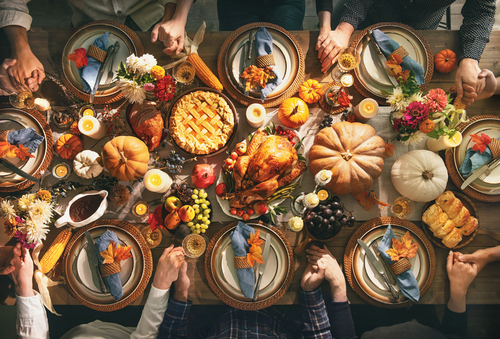
As the leaves turn and the air chills, families across the nation are preparing for the quintessential American tradition of Thanksgiving. However, beneath the surface of this festive gathering lies a potential minefield of discord. With November 23 drawing near, there’s been a notable uptick in individuals searching for strategies to avoid the infamous ‘Thanksgiving fight’.
The first paragraph of our exploration into Thanksgiving tensions reveals a startling statistic: a mere 12 percent of families claim to be entirely free of disputes during these holiday gatherings. This suggests that the vast majority of American families are no strangers to the occasional heated debate over the dinner table.
Anti-Gun Group Roasted for Urging People to Turn Thanksgiving Dinners Into Family Arguments https://t.co/zEvLdDmNXr
— Tea Party Patriots (@TPPatriots) November 22, 2023
Travel woes add fuel to the fire, with an estimated 55.4 million Americans embarking on journeys of at least 50 miles to reunite with loved ones. The combination of congested highways and airport delays only serves to fray nerves further, setting the stage for potential conflict upon arrival.
Experts have weighed in with advice on how to keep the peace. Ground rules against discussing politics are a common recommendation, with the aim of preempting arguments before they can begin. Others advocate for addressing significant issues but emphasize the importance of doing so with empathy and a willingness to listen.
This Thanksgiving the Best way to avoid political arguments at the table….
Invite a Bear!
Nobody argues when you invite a Bear…. pic.twitter.com/V2GoEnJLNh— problembear (@problembear) November 20, 2023
Despite these well-intentioned strategies, certain topics are almost guaranteed to ignite controversy. Politics, family issues, and financial matters top the list of contentious subjects. The current political climate, with its polarizing figures and policies, is particularly prone to sparking disputes among relatives with differing viewpoints.
Interestingly, the likelihood of an argument breaking out can often be predicted based on the family members involved. Fathers, grandmothers, and grandfathers are frequently identified as the most common instigators of Thanksgiving quarrels. This could be attributed to generational differences or simply the dynamics of family hierarchy.
Social media has become a barometer for public sentiment, with users sharing humorous memes and personal anecdotes about their Thanksgiving experiences. These online exchanges reflect a collective awareness of the holiday’s potential for conflict, as well as a shared desire to navigate it with humor and grace.
In conclusion, while Thanksgiving is a time for gratitude and family, it is also a time when underlying tensions can surface. By approaching these gatherings with a plan for diplomacy and understanding, families can hope to enjoy a holiday that is memorable for the right reasons. As we gather around the table this year, let us remember that the true spirit of Thanksgiving lies in coming together, despite our differences.












